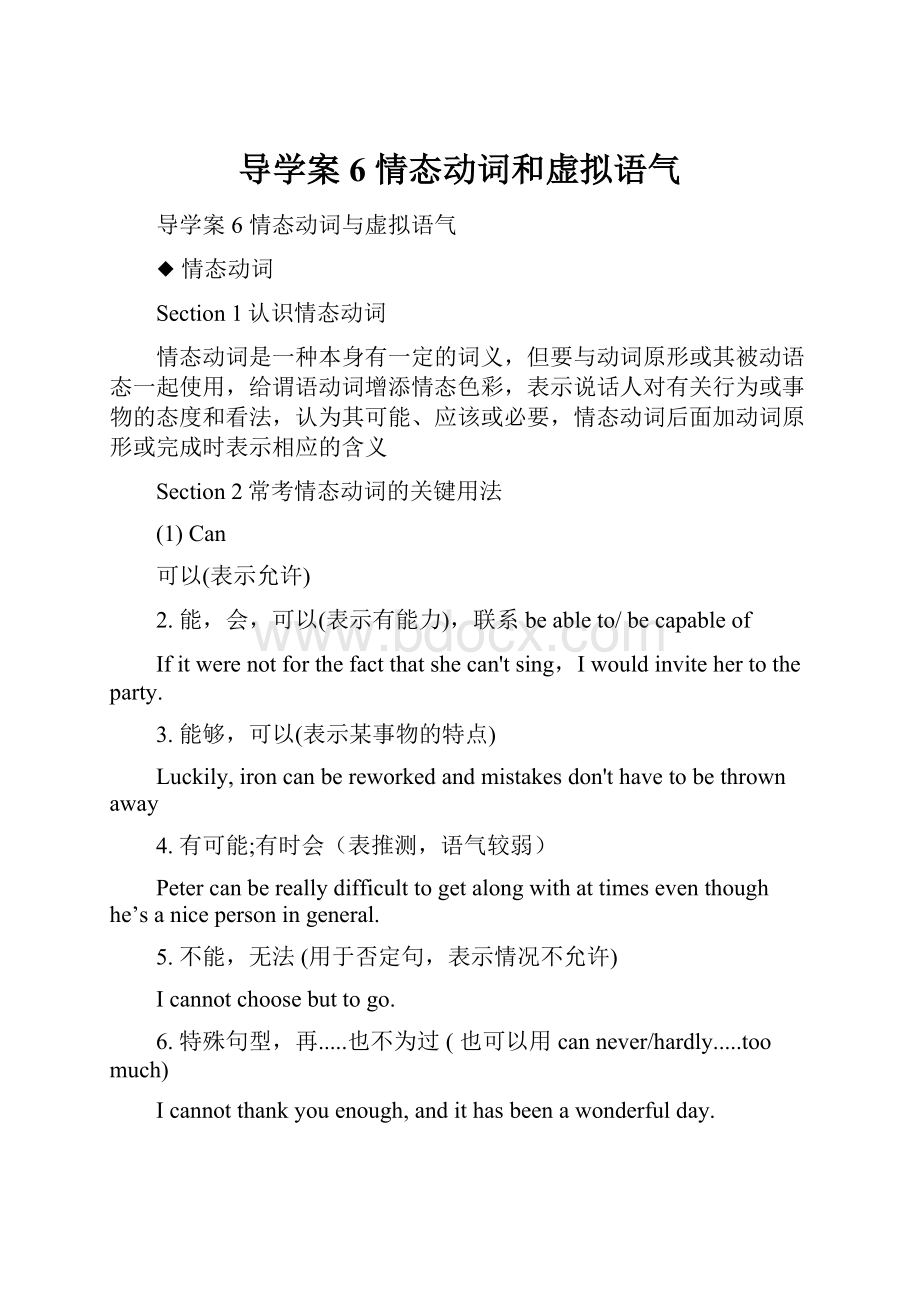导学案6 情态动词和虚拟语气.docx
《导学案6 情态动词和虚拟语气.docx》由会员分享,可在线阅读,更多相关《导学案6 情态动词和虚拟语气.docx(16页珍藏版)》请在冰豆网上搜索。

导学案6情态动词和虚拟语气
导学案6情态动词与虚拟语气
◆情态动词
Section1认识情态动词
情态动词是一种本身有一定的词义,但要与动词原形或其被动语态一起使用,给谓语动词增添情态色彩,表示说话人对有关行为或事物的态度和看法,认为其可能、应该或必要,情态动词后面加动词原形或完成时表示相应的含义
Section2常考情态动词的关键用法
(1)Can
可以(表示允许)
2.能,会,可以(表示有能力),联系beableto/becapableof
Ifitwerenotforthefactthatshecan'tsing,Iwouldinvitehertotheparty.
3.能够,可以(表示某事物的特点)
Luckily,ironcanbereworkedandmistakesdon'thavetobethrownaway
4.有可能;有时会(表推测,语气较弱)
Petercanbereallydifficulttogetalongwithattimeseventhoughhe’sanicepersoningeneral.
5.不能,无法(用于否定句,表示情况不允许)
Icannotchoosebuttogo.
6.特殊句型,再.....也不为过(也可以用cannever/hardly.....toomuch)
Icannotthankyouenough,andithasbeenawonderfulday.
7.可能(can可用于否定句/疑问句中表猜测,canhavedone表示对过去的猜测猜测)
—Canhehavebeenchosenascaptainofthefootballteam?
—Yes,hemusthave.
注:
在以上用法中,我们尤其要注意的是2,4,7
(2)Could
1.能;会(表示发生在过去的能力,是can的过去式)
Formyreturnjourney,IfeltIcouldaffordtheextraandtravelfirstclass
2.–用在疑问句中表示征求对方意见(委婉的语气用could,回答时用can)
CouldIhavealook?
--Ofcourseyoucan.
3.可能(表示某事可能属实或可能发生,对将来或者现在发生事情的肯定猜测)
Animprovementinlivingstandardscouldbeyearsaway
4.用于与你语气,表示对过去的推测或假设
Hedidnotregretsayingwhathedidbutfeltthathecouldhaveexpresseditdifferently.
(3)May
1.有可能,也许(表推测)
Somepeoplewhodon’tliketotalkmucharenotnecessarilyshy;theymayjustbequietpeople.
2.祝;但愿
MayGodblessyou!
(4)Might
1.可不可以,能否(用于礼貌地打断别人.提出问题.做出请求或引出接下来要说的话)
IwaswonderingifImightaskyouafavor?
2.可能(表不是很有把握的猜测,语气比may弱)
3.虚拟语气,表示假设过推测,语气若
Itoldyourfriendhowtogettothehotel,butperhapsImighthavedrivenherthere.
此处,mighthavedone表虚拟语气,意为“过去原本可能/可以做到的事而未做
(5)Will
1.将(表示将来,等于begoingto,betodo,beabouttodo,shall/shoulddo)
Thelowtestscore,theythink,willmakeitimpossibleforthemtogetintoagoodcollege.
2.愿意Hewillbecomehersenioradviser---herdeputy,ifyouwill.
3.表必然性Manwilldiewithoutair.
(6)Would
1.将,将会(表示判断或看法)
Johnpromisedhisdoctorhewouldnotsmoke,andhehasneversmokedeversince
2.表示意愿
Shewouldn’tchangeiteventhoughsheknewitwaswrong.
(7)Shall
1.表将来用于No.1人称
We/Ishallcallyoubackthisafternoon.
2.shall用在疑问句中,且主语为No.1/No.3人称,表示征求对方意见
---HasMr.TomWhitearrived?
---Yes,already.Shallhewaitoutsideorjustcomein?
3.shall用在陈述句中,且主语为No.2/No.3人称时,表示允诺、命令、警告、决心或规定
Theyshallnotbeallowedinafter11p.m.
(8)should/oughtto
1.应该;应当(表推测)
—IthinkI’llgiveBobaring.—Youshould.Youhaven’tbeenintouchwithhimforages.
2.应该,必须(表示给出指示或公布官方命令)
—MargaretshouldnotstayathomealldaylonginfrontoftheTV.
3.应该,可能(表示预期或可能性)
Thereshouldnotbeanydifficultyaboutpassingtheroadtestsinceyouhavepractisedalot
4.将要,假定要(用在虚拟条件从句中表示事件发生的可能性)
Ifyoushouldbefired,yourhealthandpensionbenefitswillnotbeautomaticallycutoff
5.应该(用在某些动词、名词之后that引导的虚拟语气从句中)
Iinsistedthatweshouldhavealookateverycar
6.shouldhavedone与shouldnothavedone
注:
oughtto与should的用法区别如下
1.一般说来,两者可替换,只是oughtto语气稍重。
如:
Yououghtto/shouldgoandseeMary.你应该去看看玛丽。
2.表示出于法令规则、行为准则、道德责任等客观情况而“应该”做某事时,一般应用oughtto,
若用should则强调个人意见、主观看法。
如:
WeoughttogoandseeMarytomorrow,butIdon’tthinkwewill.
明天我们按理应该去看看玛丽,但是我认为我们去不了。
(此句不宜用should)。
3.在公告、须知或条例中,出于礼貌,常用should.如:
Youshouldnotrunalongsidetheswimming-pool.不准在游泳池边奔跑
(9)Must/haveto
1)两词都是'必须'的意思,haveto表示客观的需要,must表示说话人主观上的看法,既主观上的必要。
Mybrotherwasveryill,soIhadtocallthedoctorinthemiddleofthenight.
我弟弟病得很厉害,我只得半夜里把医生请来。
(客观上需要做这件事)
Hesaidthattheymustworkhard.他说他们必须努力工作。
(主观上要做这件事)
2)haveto有人称.数.时态的变化,而must只有一种形式。
但must可用于间接引语中表示过去的必要或义务。
Hehadtolookafterhissisteryesterday.
3)在否定结构中:
don'thaveto表示"不必"mustn't表示"禁止",
Youdon'thavetotellhimaboutit.你不一定要把此事告诉他。
Youmustn'ttellhimaboutit.你一定不要把这件事告诉他。
(10)Need/dare
1.必要(need作为情态动词只用于否定句和疑问句中,needn’thavedone表示过去本不必做的事却做了)
—Catherine,Ihavecleanedtheroomforyou.
—Thanks.Youneedn’thavedoneit.Icouldmanageitmyself.
2.可能,大概;想必,我想【固定搭配】
IdaresayyouareBritishbutyoustillneedapassporttoproveit.
3.敢(dare作为情态动词只用于否定句和疑问句中)
Thegovernmentdarenotraiseinterestratesagain.
【解析】1.need/dare作情态动词无人称或数的变化,后接动词原形,多用于否定句和疑问句中,但Idaresay例外。
2.need作为行为动词有人称和数的变化,后面可接名词、代词、动名词及带to的动词不定式;可用于肯定句、疑问句和否定句中。
3.dare用作实义动词,其后可带动词不定式,否定句中也可带省to不定式,且有人称和数以及时态的变化。
Section3情态动词重点用法小结
1.表示推测(可能性)
词形
含义
must
必然.必定//
should
按说应该//
oughtto
按说应该//
can/
不可能有可能吗?
could
微弱的可能不可能语气比can弱
may
或许,也许,可能不/
might
比may还弱比maynot还弱
所以:
表示肯定推测时语气强弱为:
Must>should/ought>can>could>may>might
对现在或者将来可能发生事情的猜测的结构为:
情态动词+V(原形)
对过去可能发生事情的猜测的结构为:
情态动词+havedone
例如:
Hemay/might/must/shouldbeonhiswayhomenow.(现在)
Ididnothearthephone.Imusthavebeenasleep.(过去)
2.情态动词+havedone除表示正常推测之外,还引申出了其他含义
短语
含义
musthavedone
(过去)想必/准是/一定做了
couldhavedone
过去本可以做而未做
can’t/couldn’thavedone
过去不可能做了
may/might(not)havedone
(过去)本可以做到而没做到”
should/oughttohavedone
(过去)本该做某事,而实际上未做
shouldnot/oughtnottohavedone
(过去)本不该做某事,而实际上做了
needn’thavedone
(过去)本不必做某事而做了
hadbetter(not)havedone
(过去)最好(没)做了
wouldrather(not)havedone
宁愿(过去)(没)做了
wouldlike/love(not)tohavedone
(过去)本(不)打算做但未做成
Section4情态动词解题技巧
关键词:
一情,二境,三时
(1)认真审题,结合所给出的语境,正确把握说话者的语气.情感.态度.观点等。
(2)认真思考所给选项中情态动词的基本特征和用法,并结合语境推敲答案。
(3)要注意把握时间概念。
情态动词经典考题
1.I’mgoingtoEuropeonvacationtogetherwithJohnifI___findthemoney.
A.canB.mightC.wouldD.need
2.Thenewlawstatesthatpeople______driveafterdrinkingalcohol.
A.wouldn'tB.needn'tC.won'tD.mustn't
3.Sorry,Iamtoobusynow.IfI________time,Iwouldcertainlygoforanoutingwithyou.
A.havehadB.hadhadC.haveD.had
4.Welastnight,butwewenttotheconcertinstead.
A.musthavestudiedB.mightstudyC.shouldhavestudiedD.wouldstudy
◆虚拟语气
Section1认识虚拟语气
虚拟语气又叫第二条件句,是相对于第一条件句而言,所谓第一条件句指的是主句的发生以从句为条件,叫常见的引导词有if,unless,once等,多符合主将从现原则,而第二条件句,虚拟语气,多指一种假设,或者美好的愿望,按虚拟时间划分,可分为三类,对过去情况的假设,对现在情况的假设,对将来情况的假设。
练习:
判断下列句子类型
1.Ifwespendallofourtimeplayinggames,wewillfailtheexams.
2.Studyhardandyouwillsucceedsoonerorlater.
3.IfIwereyou,Iwouldlistentohisadvice.
4.Ifyouhadfollowedmyadvicejustnow,youwouldbebetternow.
6.Ifitshouldraintomorrow,wewouldnotgoclimbing
Section2虚拟语气用法详解
一、 条件句中的虚拟语气
1. 条件句中虚拟语气的形式 (主从符合条件句,有从句有主句,可以互相作为判断依据)
从句中提出一种与客观现实不相符或根本不可能存在的条件,主句会产生的一种不可能获得的结果。
条件句中的虚拟语气根据不同的时间有三种不同的形式。
时间
从句谓语形式
主句谓语形式
过去
had +动词过去分词
would/should/might/could have done
现在
动词过去式(be 用 were)
would/should/might/could +do
将来
动词过去式(be用were)
should + do
were to + 动词原形
would/should/might/could + do
2. 条件句中的虚拟语气的举例
If he should go to Qing Hua University, he make full use of his time.
If he were to come here, he would tell us about it.
If he free, he would help us.
If he(study)at this school, he would know you well.
If I (see) the film,I would have told you about it
If I had got there earlier, I would have met Mr. Li.
3. 运用条件句中的虚拟语气时,须注意的几个问题
(1) 当从句的主语为第三人称单数时,谓语动词若是系动词be时,可用 was 代替 were。
但在倒装虚拟结构及 if I were you, as it were 中,只能用 were。
如:
Were I ten years younger, I would study abroad. 要是我还年轻十岁的话,我会去国外学习。
If I were you, I would try my best to grasp the chance. 要是我是你的话,我要尽力抓住这次机会。
(2) 有时,虚拟条件句中,主、从句的动作若不是同时发生时,须区别对待,这种情况叫做混合虚拟语气。
例如:
If they had informed us, we would not come here now.
If he were free today, we would have sent him to Beijing.
If it had not been raining too much, the crops would be growing much better.
If he had been working hard, he would be working in the office now.
(3) 当虚拟条件句的谓语动词含有 were, should, had 时,if 可省略,而将 were, should, had等词置于句首。
如:
Should he agree to go there, we would send him there.
Were she here, she would agree with us.
Had he learnt about computers, we would have hired him to work here.
(4) 有时,句子没有直接给出假设情况的条件,而须通过上下文或其他方式来判断。
如:
I would have come to see you, but I was too busy. 我本该来看你了,然而我太忙了。
But for his help, we would be working now. 要不是他的帮助,我们还会在工作呢。
Without your instruction, I would not have made such great progress. 要是没有你的指导,我不会取得如此大的进步。
(5) 有时,虚拟条件句中,主、从句可以省略其中的一个,来表示说话人的一种强烈的感情。
①省略从句
He would have finished it. 他本该完成了。
You could have passed this exam. 你应该会通过这次考试了。
②省略主句
If I were at home now. 要是我现在在家里该多好啊。
If only I had got it. 要是我得到它了该多好啊。
二、其他状语从句的虚拟语气
1. 目的状语从句中的虚拟语气
(1) 在 for fear that, in case, lest(以防,万一) 引导的目的状语从句中,若用虚拟语气时,从句谓语为:
should + 动词原形,并且 should 不能省略
She examined the door again for fear that a thief should come in.
(2) 在 so that, in order that 所引导的目的状语从句中,从句中的谓语为:
can / may / could / might / will / would / should + 动词原形。
如:
He goes closer to the speaker so that he can hear him clearer.
2. 让步状语从句中的虚拟语气
(1) 在 even if, even though 所引导的让步状语从句中,可用虚拟语气,主句、从句的结构与 if 所引导的条件从句结构相同。
如:
Even if he were here himself, he should not know what to do.
3. 英语中,wish 之后的宾语从句,表示一种没有实现或根本不可能实现的愿望,常用虚拟语气。
其虚拟语气的结构为与主从复合句中从句的谓语动词一致
例如:
I wish she were not married. 我真希望她没结婚。
I wish the bus went to the university. 我希望公共汽车能通到大学。
I wish I hadn’t wasted so much money. 但愿我没浪费这么多钱。
注意,从句的时态只与从句所指的时间有关,而与 wish 的时态无关。
比较:
I wish I were rich. 要是我现在有钱就好了。
I wish I had been rich. 要是那时我有钱就好了。
4. 英语中,would rather, had rather, would sooner等之后的宾语从句常表示与客观事实不相符的一种愿望,故使用虚拟语气。
其虚拟语气的结构为:
过去:
had + 过去分词;
现在:
过去时(be 用were )
将来:
过去时(be 用were )
例如:
Iwould rather you had seen the film yesterday. 我倒想你昨天看过了这场电影。
Iwouldrather you were here now. 我倒想你现在在这儿。
Wewould rather you went here tomorrow. 我么倒想你明天去那儿。
5.主语从句中的虚拟语气
在表达惊异、惋惜、遗憾、理应如此等意义的主语从句中常使用虚拟语气,其虚拟语其的结构为:
should + 动词原形,主句中的谓语动词形式不限。
(1) It is admirable / dreadful / extraordinary / odd / remarkable / sad / advisable / annoying / disappointing